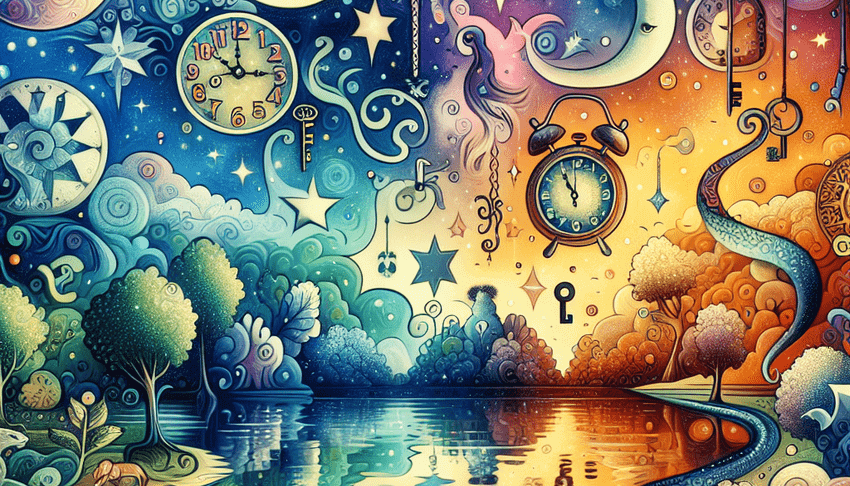Table of Contents
The Battlefield Within

Conflict Dreams as a Mirror of Internal Struggle
Dreams of conflict and war serve as powerful metaphors mirroring our inner turmoil and unresolved emotional battles. Interpreting ‘War in dreams’ can be a complex task, but with a thoughtful analysis, we can uncover the layers of ‘conflict symbolism’ that reside within our subconscious mind. By ‘analyzing dreams of war’, we can gain insights into our deepest fears, desires, and potential pathways to personal growth and development.
Understanding the Language of Conflict in Dreams
Dream interpretation is an age-old practice, and in the context of conflict dreams, symbols often represent the dreamer’s personal struggles. The images of war or battle may not necessarily relate to actual physical conflict but often pertain to internal dilemmas. For instance, a dream where one is chased by an unknown enemy could signify running away from facing a challenging situation in waking life.
- Analyzing Dreams of War: A reflection of internal chaos, such as making a controversial decision that pits one part of the psyche against another.
- Conflict Symbolism: Characters or elements that participate in the dream warfare often embody different aspects of the dreamer’s identity or life circumstances.
- The emotional tone of the dream: It provides clues to the emotional charges surrounding the dreamer’s real-life conflicts.
Deciphering Personal Struggles Through Dream Examples
Let us consider a real-life example where someone might dream of a battlefield. The dream depicted an intense fight ongoing, with the dreamer feeling helpless and unable to choose a side. Upon reflection, this person recognized a correlation between the dream and their waking life indecision about career paths—one path being safe but unsatisfying, the other risky yet fulfilling. The internal conflict about security versus passion was beautifully illustrated in the dreamer’s nightly narratives.
- Work and Relationships: Frequent dreams of conflict in workplace settings can symbolize job dissatisfaction or interpersonal issues with colleagues.
- Emotional Introspection: Dreams where one struggles to find their way out of a warzone might echo feelings of entrapment in a toxic personal relationship.
- Inner Conflicts and Growth: A dream of negotiating peace in a war-torn landscape could represent an internal journey toward reconciling conflicting parts of oneself.
Leveraging Dream Insights for Personal Development
Analyzing dreams that feature themes of war is not merely an exercise in curiosity. It serves as a valuable tool for personal development. Recognizing the underlying messages can catalyze emotional healing and growth. By facing the conflicts presented in our dreams, we engage with our deeper self, potentially leading to resolutions that might elude us in our waking hours.
War and conflict in dreams are much more than nocturnal dramas; they are profound reflections of our internal struggle. By interpreting their symbolism with academic rigor and an openness to the complexity of the human psyche, we can transform our internal battles into stepping stones for personal growth. Remember, the battleground of our dreams can become the fertile ground for our waking evolution.
Deciphering Dream Combatants and Allies
Analyzing dreams of war often unveils a complex tapestry of emotions and subconscious thoughts. The characters that engage in the dreamscape battles, whether they stand as allies or adversaries, can offer profound insights into our inner world. These personifications might not always represent external individuals but can symbolize different parts of our own personality or psyche. Their interactions during the conflict provide a rich ground for interpretation.
Interpreting Enemies in Dreams
In dream symbolism, enemies often embody the aspects of ourselves we are in conflict with. These could include self-doubt, fear, anger, or any negative traits we might be battling in our waking life. They might also signal conflicts with certain people or situations externally that are influencing our emotional well-being. Particularly, war in dreams may suggest a struggle for power or control either within ourselves or in some aspect of our daily interactions.
- A dream of battling a known figure may indicate unresolved issues or conflicts with that person.
- Confronting a faceless enemy can suggest an internal struggle with unnamed fears or anxieties.
- Defeating an enemy in a dream might symbolize overcoming a challenge or fear.
Dream Allies and Their Meanings
Allies in dreams, on the other hand, can represent the supportive qualities or people in our lives. They may reflect inner strengths, such as courage, resilience, or wisdom, that we can draw upon during challenging times.
- Receiving help from an ally might suggest that you have or need support in a personal conflict or challenge.
- An ally that is a known friend or loved one can reflect the strength of your relationships and their positive influence.
- Dreaming of fighting alongside an unknown ally may indicate new found inner strengths or resources that you have recently discovered within yourself.
The Role of Unknown Figures in Dream Battles
Dreams often feature unknown characters, and these figures can be particularly telling. They might reflect parts of ourselves that we are not fully conscious of or external forces that are shaping our experiences and perceptions.
- An unknown ally could symbolize latent talents or aspects of our personality waiting to be acknowledged and embraced.
- If the unknown figures are enemies, they might represent unfamiliar challenges or fears that have not yet come to the surface.
- Neutral or indistinct characters in the midst of dream conflict might indicate uncertainty or a search for identity and personal meaning.
By examining the nature of combatants and collaborators in our dreams, we begin to unravel the complexities of our emotional landscape. Conflict symbolism in dreams not only provides a reflection of our waking life struggles but also points to the strategies and strengths we can muster to face these challenges. It encourages a thoughtful analysis of who we are, both in our dream world and in reality, thus forging a stronger connection between our subconscious understanding and conscious actions.
Symbolism and the Self

The Weapons We Wield in Dreams
Dreams weave complex narratives, often enigmatic and full of symbols that tap into the subconscious realm of our minds. Among the myriad images that may populate our nocturnal adventures, weapons frequently surface. Interpreting these symbols requires a nuanced understanding of the dreamer’s psyche and the circumstances framing the dream. In this exploration of dream symbolism, we’ll delve into the arsenal of the subconscious, analyzing dreams of war and the intricate meanings behind the weapons we wield in our dreams.
The Personal Arsenal: Understanding Weaponry in Dreams
When a weapon appears in your dream—be it a gun, a sword, or something more archaic—it often bears significant weight related to your emotional state and life context. Conflict symbolism in dreams, particularly in relation to weaponry, can reflect a variety of internal and external conflicts. For instance, weapons might symbolize the dreamer’s inner strength and assertiveness or perhaps hint at the need to fight for one’s convictions.
- Firing a gun might relate to the dreamer’s need to make a quick and decisive decision in waking life.
- Wielding a sword may represent the courage to face one’s personal battles and cut through life’s complexities with honor and integrity.
- Holding a shield could suggest a defensive posture, protecting oneself from external criticism or emotional harm.
However, context is critical. A gun might exude a sense of power, but it can also express a subconscious need for protection or reveal fears of aggression either from within or from external sources.
Context and Emotional Landscape: Deciphering the Symbolism
War in dreams can reflect periods of tumultuous change or intense personal struggle. The presence of weapons therein often underscores the nature of the battle. Analyzing dreams of war and the associated weaponry involves scrutinizing the immediate emotional landscape of the dreamer.
- If the dreamer is actively engaged in battle, it may mirror a waking life conflict where they feel they must stand their ground.
- Dreams of witnessing a war might symbolize the dreamer’s perception of conflict around them, perhaps feeling caught in the crossfire of opposing viewpoints.
- A broken or unusable weapon could indicate feelings of powerlessness or inadequacy in facing life’s challenges.
The lens of dream interpretation gains clarity through the integration of real-life events, as personal experiences cast shadows and illuminate the symbols that emerge in dreams.
Transformative Potential: From Symbols to Insight
Analyzing dreams of war, with their inherent conflict symbolism, can offer potent insights into our self-perception and the ways we handle conflict. A dream about clashing with enemies using modern weapons of war could mirror a conflict with contemporary implications, such as workplace rivalry or social strife.
In contrast, medieval weaponry like swords and bows connotes a more noble or traditional approach to conflict, possibly indicating that the dreamer values principles and honor over brute force.
- Conquering foes with a high-tech arsenal might signify a strategic approach to life’s battles, relying on intellect and planning.
- Conversely, resorting to brute force with primitive weapons might reflect raw emotions and a lack of control.
Taking a step back from the dreamscape to analyze these symbols can provide a valuable roadmap for personal growth and Emotional Intelligence. Understanding the conflict symbolism in our dreams offers a channel for addressing our fears, stresses, and the ways in which we assert ourselves in the real world. Hence, the swords and shields of our subconscious are not merely relics of sleep but vital tools for mental and Personality Development.
The Allies and Adversaries of Our Dream World
Analyzing dreams of war and interpreting the roles of allies and adversaries can offer profound insights into an individual’s subconscious concerns and aspirations. When we consider conflict symbolism in the context of dream analysis, these figures are not just mere players in a nocturnal drama; they represent critical aspects of our inner world and external reality.
Understanding Allies in Dreams
- Support Systems: Allies in dreams often reflect the people, beliefs, or resources in our waking life that offer support and strength. They could symbolize close friends, family, or even personal values that help us navigate through challenges.
- Inner Strengths: Sometimes these characters represent innate abilities or qualities that we can draw upon in times of need. An ally might embody resilience, wisdom, or creativity that the dreamer possesses but has yet to fully acknowledge or utilize.
- Guidance and Affirmation: Encounters with allies in dreams might also signify the need for guidance or confirmation of the dreamer’s path. They can appear during periods of decision-making or transition, offering a sense of validation and direction.
Deciphering Adversaries in Dreams
- Internal Conflicts: Adversaries often symbolize the conflicting parts of our psyche, such as fears, doubts, or negative behaviors. They can reveal the struggles we are facing within ourselves, prompting us to confront and address these challenges.
- External Obstacles: Dreaming of an adversary may also reflect real-life obstacles or opponents. Whether it’s a competitive work environment or a personal dispute, these characters can embody the stresses we experience daily.
- Transformation and Growth: Interestingly, adversaries in our dreams are not solely negative. They challenge us, pushing us towards growth and self-improvement. By engaging with these characters, we can learn about our limitations and how to transcend them.
By carefully analyzing dreams of war, one can gain a better understanding of the dreamer’s emotional landscape. For instance, a dream where a trusted friend stands alongside the dreamer in a battle might indicate strong bonds and reliable support systems in waking life. Conversely, an unknown enemy could represent an unacknowledged fear or an unexpected challenge that the dreamer needs to face.
These interpretations, however, are not one-size-fits-all. Individual life experiences and emotions greatly influence the meaning of allies and adversaries in dreams. Consequently, a detailed and personalized analysis is crucial for an accurate interpretation. Through such tailored evaluations, individuals can uncover actionable insights about their personal and emotional development, leading to greater self-awareness and progress in their conscious lives.
In conclusion, the dream realm offers a symbolic stage where the characters of allies and adversaries play out the psychological and emotional narratives of our lives. By exploring and interpreting these dream figures, we can unlock deeper self-understanding and harness our dream world’s wisdom to guide our personal growth and emotional intelligence.
Summary
Dreams of war and conflict are not uncommon and provide a fascinating window into our internal world. Interpreting these dreams requires a sensitivity to the rich tapestry of our subconscious and the symbolic language it employs. Dreams of War and Conflict often embody the inner battles we face, from ethical dilemmas to emotional turmoil. To unravel the complexities of these nocturnal narratives, we must understand how they echo our waking lives.
Dream interpretation suggests that the chaotic scenes of war represent the dreamer grappling with significant life decisions or unresolved psychological conflicts. The characters and landscapes of war in our dreams translate to various elements of our persona and experiences. These manifestations point us toward deeper self-knowledge and potentially illuminate pathways to personal growth.
For example, someone dreaming of being on a battlefield, unable to pick a side, might be dealing with a waking life indecision, perhaps related to career choices or moral quandaries. The symbolism of combat often mirrors real-life scenarios where one feels torn or in the midst of change.
- Work and personal relationships frequently star in these inner conflicts. Dreaming of skirmishes at the office, for instance, can reveal underlying job dissatisfaction or contentious dynamics with colleagues.
- Conversely, an individual trying to navigate safely out of a dream warzone could reflect real-life feelings of entrapment within toxic personal relationships.
- On a more positive note, a dream involving negotiating peace amid a battle suggests efforts toward reconciling inner divides or personal transformation.
But Dreams of War and Conflict aren’t just reflections—they can be catalysts for development. By confronting the issues they raise, we can instigate emotional healing and growth. Such insights gleaned from dreams can often lead to real-world solutions for our waking problems, rooted in the wellspring of our subconscious mind.
Emotionally intelligent individuals possess an enhanced ability to navigate these dream symbols. They are adept at recognizing themes and managing the intense emotions that unfold in the dream world. Higher Emotional Intelligence (EI) leads to greater insight into dreams, paving the way for growth and resolving conflicts on both the personal and interpersonal front.
- Emotional Intelligence fosters self-awareness, allowing for the recognition of repetitive war themes within dreams, signaling unresolved life conflicts.
- Through self-regulation, we can reflect on and manage the accompanying dream emotions instead of being consumed by them.
- A developed sense of empathy can provide clues about the emotional states of dream characters, translating to insights into our social interactions.
In essence, Dreams of War and Conflict often function as a mirror, reflecting the turbulence within. They are not just remnants of our waking conflict but a profound commentary on our emotional and psychological state. Armed with the insights from these dreams and guided by Emotional Intelligence, we can turn our internal battles into opportunities for enlightenment and growth. The very act of dreaming becomes a therapeutic session, offering hope and the potential for self-transformation.
FAQ – Dreams of War and Conflict: Interpretation
How can dreams involving war and conflict reflect our inner state and emotions?
Dreams featuring war and conflict often mirror our internal battles, emotional struggles, or feelings of being overwhelmed by life’s challenges. Such dreams could reflect our subconscious attempts to resolve tension, be it personal, professional, or related to self-perception. By understanding the context and emotions of these dreams, we can gain insights into our own coping mechanisms and unacknowledged stressors.
What can dreams about war and conflict reveal about our subconscious fears and anxieties?
Dreams about war and conflict often symbolize internal turmoil or external pressures that the dreamer is experiencing in waking life. These vivid dreams can reveal deep-seated fears about chaos, loss of control, or confrontations that one might try to avoid or manage subconsciously. Allowing ourselves to explore these dream themes can lead to greater self-awareness and offer insights into how we can address our anxieties more constructively.
What is the significance of dreaming about war and conflict?
Dreaming about war and conflict often indicates a struggle or tension you’re experiencing in your waking life, reflecting internal battles, disagreements with others, or a sense of being overwhelmed by challenges. Such dreams can also symbolize a fear of change or a feeling of losing control, as war represents chaos and severe disruption, urging you to look for ways to restore peace and order within yourself or your relationships.




